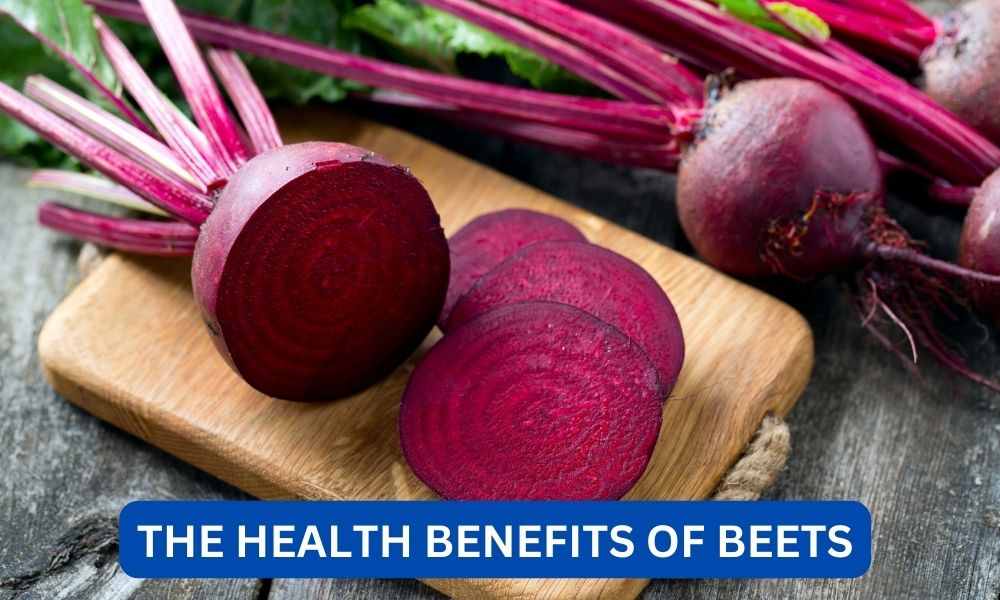Beets, also known as beetroot, are a root vegetable that have been consumed for centuries for their numerous health benefits. They have a distinct deep red color and a sweet, earthy flavor. While they may not be the most popular vegetable, beets are packed with essential vitamins, minerals, and antioxidants that make them a nutritional powerhouse. In this article, we will explore the various health benefits of beets and why you should consider adding them to your diet.
Contents
Nutritional Profile of Beets
Beets are low in calories and high in essential nutrients, making them an excellent addition to any diet. According to the United States Department of Agriculture (USDA), one cup of raw beets (136 grams) contains:
- 58 calories
- 13 grams of carbohydrates
- 4 grams of fiber
- 2 grams of protein
- 0 grams of fat
- 148 micrograms of folate (37% of the recommended daily intake)
- 442 milligrams of potassium (12% of the recommended daily intake)
- 6 milligrams of vitamin C (11% of the recommended daily intake)
- 31 milligrams of magnesium (8% of the recommended daily intake)
- 1 milligram of iron (6% of the recommended daily intake)
Beets are also a good source of other essential vitamins and minerals, including vitamin B6, manganese, and phosphorus. They are also rich in antioxidants, such as betalains and betacyanins, which give beets their vibrant color.
Read:What are the benefits of liquid chlorophyll?Health Benefits of Beets
Beets have been used for medicinal purposes for centuries, and modern research has confirmed their numerous health benefits. Here are some of the most significant health benefits of beets:
1. Lower Blood Pressure
High blood pressure, also known as hypertension, is a significant risk factor for heart disease, stroke, and other health problems. Beets contain nitrates, which are converted into nitric oxide in the body. Nitric oxide helps to relax and dilate blood vessels, which can lower blood pressure.
A study published in the American Heart Association’s journal Hypertension found that drinking one cup of beetroot juice daily for four weeks significantly lowered blood pressure in people with hypertension. Another study showed that consuming 500 grams of beetroot juice daily for six days reduced systolic blood pressure by an average of 8 mmHg.
2. Improve Athletic Performance
Beetroot juice has become a popular supplement among athletes due to its potential to improve performance. The nitrates in beets can increase blood flow and oxygen delivery to muscles, which can enhance exercise performance. A study published in the Journal of Applied Physiology found that drinking beetroot juice before exercise increased the time to exhaustion by 16% in healthy adults.
Read:What are the benefits of ginseng? All you need to knowAnother study showed that consuming 140 ml of beetroot juice daily for six days improved running performance in trained athletes. These findings suggest that beets may be a natural and effective way to boost athletic performance.
3. Boost Brain Health
Beets contain high levels of nitrates, which can improve blood flow to the brain and enhance cognitive function. A study published in Nitric Oxide found that drinking beetroot juice improved blood flow to the frontal lobe of the brain, which is responsible for decision-making and problem-solving.
Another study showed that consuming beetroot juice daily for four days improved cognitive function in older adults. The researchers believe that the nitrates in beets may help to prevent age-related cognitive decline.
4. Support Digestive Health
Beets are an excellent source of fiber, which is essential for maintaining a healthy digestive system. Fiber helps to promote regular bowel movements, prevent constipation, and feed the beneficial bacteria in the gut. A study published in the Journal of Nutrition found that consuming a diet high in fiber from fruits and vegetables, including beets, reduced the risk of developing diverticulitis, a common digestive disorder.
Read:what are the health benefits of turmeric5. Reduce Inflammation
Chronic inflammation is linked to many health problems, including heart disease, cancer, and autoimmune diseases. Beets contain betalains, which have potent anti-inflammatory properties. A study published in the Journal of Agricultural and Food Chemistry found that betalains from beets reduced inflammation in human cells.
Another study showed that consuming beetroot juice daily for six weeks reduced markers of inflammation in people with high cholesterol. These findings suggest that beets may help to reduce inflammation and prevent chronic diseases.
6. Support Liver Health
The liver is responsible for detoxifying the body and removing harmful substances. Beets contain betaine, a compound that supports liver function and helps to protect against liver damage. A study published in the Journal of Nutrition found that betaine supplementation improved liver function in people with non-alcoholic fatty liver disease.
Another study showed that consuming beetroot juice daily for six days reduced markers of liver damage in people with fatty liver disease. These findings suggest that beets may be beneficial for liver health.
How to Incorporate Beets into Your Diet
Beets are a versatile vegetable that can be enjoyed in many ways. Here are some ideas for incorporating beets into your diet:
- Roast beets in the oven and add them to salads or grain bowls.
- Blend beets into smoothies for a nutrient boost.
- Make a beetroot hummus dip.
- Grate raw beets and add them to coleslaw or slaw salads.
- Use beetroot powder as a natural food coloring in baked goods.
Beets are also available in supplement form, such as beetroot juice powder or beetroot capsules. However, it is always best to consume whole foods whenever possible to reap the full benefits of their nutrients.
Are There Any Risks or Side Effects?
Beets are generally safe for most people to consume. However, some people may experience side effects, such as red or pink urine or stool, after consuming beets. This is a harmless condition known as beeturia and is caused by the betalains in beets.
Beets are also high in oxalates, which can contribute to the formation of kidney stones in people with a history of kidney stones. If you have a history of kidney stones, it is best to limit your intake of beets and consult with your doctor.
Conclusion:
Beets are a highly nutritious vegetable that offers numerous health benefits. They can help to lower blood pressure, improve athletic performance, boost brain health, support digestive health, reduce inflammation, and promote liver health. Beets are also versatile and can be easily incorporated into your diet in various ways. So, next time you are at the grocery store, don’t forget to pick up some beets and reap the many health benefits they have to offer.









